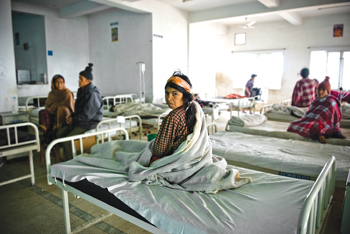Politicians may think they have more pressing matters in their hands, but the poor state of healthcare is symptomatic of massive political failure

SAM KANG LI
Poor
healthcare in Nepal is not a medical problem, it is a political one. The contrast couldn’t be starker between modern medical care in the cities with state-of-the-art diagnostics and sub-health posts across the country without basic medicines and personnel.
The ultra-commercialisation of healthcare in this country has put most medical interventions beyond the reach of all but the super rich. The only saving grace is that many now don’t have to go to Delhi or Bangkok for treatment because comparable care is available here and this saves the country money. But also true is that given the cost of ultrasounds and MRI scans, few Nepalis can afford private hospitals.
At the other end of the scale are places like Kalikot and Achham in far-western Nepal where district hospitals, such as they are, don’t have enough medicines, doctors are absent, or run clinics where they refer patients to themselves. The equipment are often not working and the generators are always out of diesel.
Which is why few people go to district hospitals when there are alternatives available. In Dadeldhura, the TEAM hospital run by the HDCS was seeing 800 patients a day and making 1,000 deliveries a year. Virtually no one went to the government hospital up the mountain. Last month, selfish and greedy local politicians forced it to close and
hounded TEAM out of Dadeldhura.
In Achham, the district hospital in Mangalsen refers patients to the charity-run Bayalpata Hospital near Sanfebagar because it has neither water nor electricity for tests and procedures. Bayalpata is run by a team of health experts from the US and Nepal, who have taken it upon themselves to prove that healthcare can and should be free, especially for the poorest, most disadvantaged, and excluded sections of society. Bayalpata isn’t trying to replace the government, it is trying to demonstrate that affordable and quality care is possible (read article).
As Duncan Maru and Roshan Bista of Bayalpata argue in their piece in this issue that healthcare has a cost even when it is free. It is the responsibility of the state to use taxes paid by citizens to pay for universal healthcare. That may seem like an unrealistic dream when successive governments waste billions to pay phantom guerrillas, loot the exchequer to distribute cash to cadre, or pocket millions in kickbacks from contracts for hydropower deals. But these are all the result of the erosion of accountability during this messy and endless transition: nothing that can’t be set right with clean elections at the national and local levels.
Even despite the lack of elections and accountability, rife corruption, and an uncaring state, Nepal has made remarkable progress in lowering the mortality rate among mothers, reducing child deaths, and increasing the average lifespan of citizens.
Institutional deliveries are going up, even in remote areas as new roads are built. The increase in female literacy has reduced the incidence of child marriages. The work of Female Health Volunteers in pushing vaccination and nutrition in rural areas has been cited as a model for other developing countries. Now, the country is poised to remove a major cause of child deaths from diarrhoeal dehydration and pneumonia by making all 75 districts open-defecation free and free of indoor firewood smoke by 2017.
Now that we are making statistical progress on quantity, however, it is time to also look at equity and quality of healthcare. As the health focus in this edition shows, there are working examples of public-private partnerships to make government hospitals affordable and efficient. If the Bayalpata model can be scaled up and spread to the cities to provide free and reliable healthcare, it would automatically reduce the commercialism in the sector because people would have alternatives.
Government hospitals are under-staffed, under-resourced, and under-supplied. Politicians may think they have more pressing matters in their hands, but they should know that the poor state of healthcare in this country is symptomatic of massive political failure.
Read also:
A healthy majority
Save the children
Phoenix rising
Holding up half the district
Crowdfund globally, act locally
Free-for-all healthcare